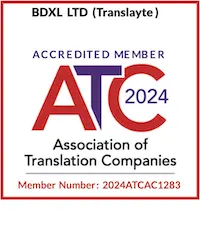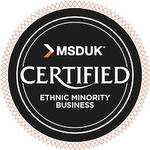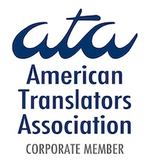Sworn Translations in the Netherlands
If you're presenting a foreign document as part of an application to an official institution in the Netherlands, then you may be asked to have it translated by a sworn translator.
We explain how to get one below.
English to Dutch Translation Services
If you're presenting an English document as part of a government, embassy or institutional application in the Netherlands, then you'd be asked to present a sworn translation.
Our Dutch translation services focus on providing high-quality, sworn translations, which are ideal for official documents that need to be accepted by authorities. Alongside sworn translations, we offer other translations, ensuring that your content is accurate and conveyed in Dutch. Whether you're translating business documents, legal papers, or marketing materials, our skilled translators ensure that every detail is properly translated, maintaining the meaning and intent of the original text while making it accessible to Dutch-speaking audiences.
Sworn Translation Requirements in the Netherlands
To become an official interpreter or translator in the Netherlands, the translator is sworn in by a Dutch court, after which he is required to be listed in the Register of Sworn Interpreters and Translators (RBTV) in order to practice as a sworn translator.
This directory is maintained by the Bureau of Sworn Interpreters and Translators (In Dutch; Bureau Wet Beëdigde Tolken en Vertalers - WBTV). To register, the individual must be able to meet certain standards relating to proficiency, ethics, and ongoing professional development. It's also necessary to obtain a certificate of conduct (Verklaring omtrent het gedrag, VOG). Once they have received their registration certificate, they can then apply to their local district court to be officially sworn in as a sworn translator. After taking the oath, the court will provide them with a written acknowledgement of their oath. A duplicate of this document should then be forwarded to the Office for Registered Interpreters and Translators.
Foreign documents to be submitted to the Immigration and Naturalization Service (IND) and issued in English, French, German or Dutch may be submitted as-is without the need for a sworn or official translation.
You will only require a sworn translation if you’re submitting a foreign document that is not issued in any of these languages. In such cases, the following rules from the IND will apply:
- Source document: The original document you want to translate, in electronic or hard copy format. Ensure it is clear and legible, so the translator can understand the content accurately.
- Target language: Determine the language(s) you want your document translated into. Dutch is the official language of the Netherlands, but you might need translations into English, German or French as well, depending on your purpose and target audience. You can also get a Multilingual standard form for an extract of civil status records (e.g. birth or marriage certificates) that do not need to be translated. A multilingual standard form is usually issued in 9 languages.
- Sworn translator: If the translation is for an official purpose, such as legal, medical, or educational documents, you will need to find a sworn translator. In the Netherlands, translators are registered with RBTV. If the sworn translator is registered outside the Netherlands, you must also have the translation legalised.
- A translation agency or freelance translator: Depending on your requirements, you can either work with a professional translation agency or hire a freelance translator. A translation agency might be more suitable if you have a large or complex project, while a freelance translator might be more cost-effective for smaller projects. Make sure to check the translator's or agency's experience, references, and reviews before making a decision.
- Budget: Establish a budget for your translation project, taking into account the complexity of the document, the language pair, the translator's experience, and any additional services you might need (e.g., proofreading, desktop publishing).
- Additional services: Depending on the type of document and your specific needs, you might require additional services like proofreading, editing, or desktop publishing to ensure the final product is of the highest quality.
Once you have all these elements in place, you can proceed with the translation process. Remember to communicate clearly with your chosen translator or agency, and provide any necessary context or reference materials to help them deliver the best possible translation.
Who is a Sworn Translator in the Netherlands?
In the Netherlands, a certified translator (gecertificeerd vertaler) refers to a translator who has obtained certification from a recognized professional translation association or organization. Certification is generally obtained by meeting specific requirements, such as education, experience, and passing examinations.
However, unlike sworn translators, certified translators in the Netherlands do not have the official legal authority granted by the courts. Their certification serves as an acknowledgement of their professional competence and adherence to certain standards in translation. Certified translators often work in various specialized fields and may provide high-quality translations for a wide range of purposes, including business, marketing, technical documentation, and more. Some certification bodies in the Netherlands are; Nederlands Genootschap van Tolken en Vertalers" (NGTV) - "Dutch Society of Interpreters and Translators", VViN" (Vereniging van Vertaalbureaus in Nederland) or "KTZ" (Koninklijke Vereniging van Tolken en Vertalers).
To become a sworn/certified translator in the Netherlands, individuals must meet specific requirements set by the Bureau Wbtv (Wet beëdigde tolken en vertalers). The requirements may include having completed a relevant translation or interpreting program, passing language proficiency exams, and demonstrating a high level of competence in their translation skills.
Documents that Require Sworn Translation in the Netherlands
Our Netherlands document translation services cover a wide range of documents, including but not limited to:
- Birth certificates
- Marriage certificates
- Divorce decrees
- Business documents
- Diplomas and transcripts
- Medical records
- Police clearance certificates
- Passports and visas
Where are Sworn Translations Required in the Netherlands?
- Immigration and Naturalization Service (IND)
- Civil Registry Offices (Gemeentehuis)
- Educational Institutions
- Notary Public
- Courts
- Government Agencies
Why will I Need Certified/Sworn Translation in the Netherlands?
- Financial Institutions: When applying for a loan, mortgage, or financial assistance, financial institutions may require sworn translations of relevant financial documents, such as bank statements, tax returns, and financial reports.
- Insurance Companies: If you need to file an insurance claim or provide documentation to an insurance company, sworn translations may be necessary for documents such as insurance policies, medical records, or accident reports.
- Medical and Healthcare: If you are seeking medical treatment in the Netherlands and your medical records or prescriptions are in a language other than Dutch, certified translations may be required by healthcare providers or hospitals.
- Intellectual Property: When registering trademarks, patents, or copyrights, or when dealing with intellectual property-related legal matters, translations of relevant documents may be necessary.
- Adoption Proceedings: In cases involving international adoption, sworn translations of adoption-related documents, such as adoption orders, home studies, and legal agreements, may be required.
- Banking and Financial Transactions: When conducting international banking or financial transactions, certified translations of financial documents, contracts, or agreements may be needed for compliance or understanding purposes.
- Public Tenders and Bids: If you are participating in public tenders or bids in the Netherlands, translations of bid documents, proposals, or contracts may need to be certified for submission.
- Professional Associations and Certifications: If you are applying for professional licenses, memberships, or certifications in the Netherlands, certified translations of relevant documents, such as professional qualifications or certifications, may be necessary.
Before proceeding with a translator, it is essential to verify their qualifications, experience, and credentials to ensure they can provide accurate and reliable translations. Here are some key documents and information you should check for; a resume/CV, certification/membership (Bureau Wbtv - Wet beëdigde tolken en vertalers), sample translation, reference/testimonial, confidentiality agreement, turnaround time & availability, rates and terms of payment.
Official or Sworn Translator for Certified Translations in the Netherlands
A sworn translator (beëdigd vertaler) in the Netherlands is an individual who has taken an oath before a court and has been officially authorized by the Dutch courts to provide translations that are considered legally valid and accurate. Sworn translators are listed in the Register of Sworn Interpreters and Translators (Register beëdigde tolken en vertalers) maintained by the Bureau Wbtv (Wet beëdigde tolken en vertalers). They are authorized to provide certified translations of official documents and have the legal authority to attest to the accuracy and completeness of their translations. Sworn translations are typically required for official purposes, such as legal proceedings, immigration, or government-related matters.
In a certified translation from Dutch to another language, the translator typically includes specific details to ensure the authenticity and accuracy of the translation. The exact requirements may vary depending on the country or institution requesting the certified translation. However, here are some common details that are often included:
- Translator's Statement: The certified translation should begin with a statement from the translator attesting to their qualifications and confirming that the translation is accurate and complete to the best of their knowledge and abilities. This statement is usually positioned at the beginning or the end of the translated document.
- Translator's Contact Information: The translator should provide their full name, address, phone number, and email address so that they can be contacted if necessary.
- Certification Statement: The translation should include a statement indicating that it is a certified translation. This statement confirms that the translator is authorized or recognized as a certified translator, either by a professional association or a relevant authority.
- Official Seal or Stamp: Many certified translations require an official seal or stamp from the translator. This seal may include the translator's name, certification number (if applicable), and other identifying information. The purpose of the seal is to authenticate the translation.
- Date of Translation: The date on which the translation was completed should be mentioned to indicate the currency of the translation.
- Signature: The translator typically signs the certified translation, indicating their acceptance of responsibility for the accuracy and completeness of the translated document.
Can I Obtain a Sworn Translation for the Netherlands Outside of the Netherlands?
Yes, it is possible to obtain a sworn translation for the Netherlands from outside the country. While sworn translations are typically provided by translators authorized by the Dutch courts, you can still engage the services of a sworn translator who is based outside the Netherlands, as long as they have been authorized by the Dutch courts.
The authorization to be a sworn translator in the Netherlands is granted by the Dutch courts rather than being geographically restricted. Therefore, there may be sworn translators who are authorized by the Dutch courts and operate internationally or remotely.
Translayte works with hundreds of registered sworn translators in the Netherlands and can help you procure sworn translations of your documents quickly and at a fair price.
Legalising Foreign Translations for use in the Netherlands
In certain cases, you may also obtain a sworn translation from your home country for use in the Netherlands. For example, sworn translations completed in Germany, Austria, Belgium or France into German or French can be used in the Netherlands if those sworn translations are accompanied by an Apostille.
Also, a legalised English translation from the UK, which contains an Apostille stamp from the Foreign and Commonwealth Office will also be acceptable to the IND.
Translayte can provide legalised translations into any of the languages that are acceptable by the Dutch authorities by working with sworn translators and obtaining Apostilles in respective countries.
Legalising Sworn Dutch Translations for use Abroad
If you wish to use a Dutch document such as a birth certificate, marriage certificate or diploma abroad, you may need to have it translated. After it has been translated, you may also need to have both the source document and the translation legalised. This is done with a stamp or sticker. After legalisation, you can use the source document and the translation abroad.
The legalisation process authenticates the signature of the sworn translator, and affixes an Apostille to the document, making it acceptable / recognised by any country that is party to the Hague Convention. Note that this is only required if the country is a member of the Hague Apostille Convention.
Sworn Translation and Certified Translations into Dutch
Sworn translations are not required in all scenarios, particularly when applying to universities or banks. In some cases, the requesting body may request a certified translation. Whilst a sworn translation into Dutch can only be completed by a translator registered with the RBTV, a standard certified translation can be provided by a professional translator or agency (such as Translayte).
Unlike the sworn translation that contains a signature and stamp from a sworn translator, our standard certified translations contain a statement of translation accuracy, accompanied by our signature & stamp, certifying that the document is a true and accurate translation (see a sample here).
We provide hundreds of certified & sworn translations for use in the Netherlands and can also procure an Apostille on these translations if they are to be submitted to the IND. Certified translations into Dutch may be cheaper than sworn translations because there is a wider pool of translators to work with, who can often deliver quickly and at low costs.
Notes
- These translation requirements are specific to the IND. Other agencies within the Netherlands may have slightly different translation requirements.
- You may be required to legalise your original document depending on the type of document, and where it was issued. We advise that you clarify requirements with the requesting authority before ordering a translation. We can only help obtain legalisation on documents issued within the UK.












































